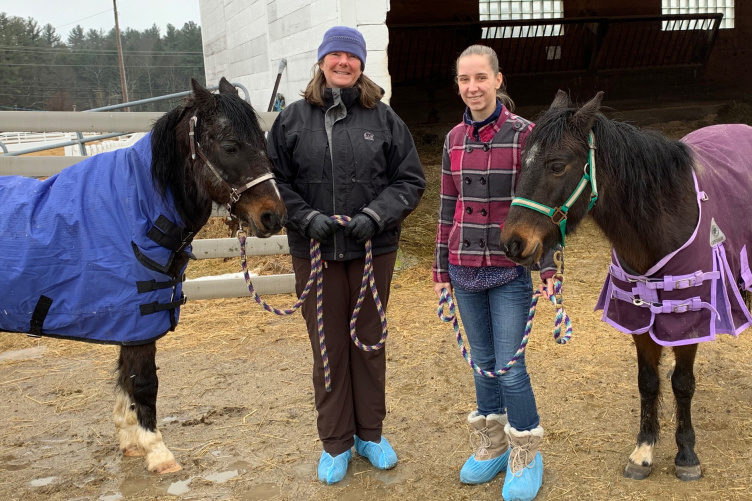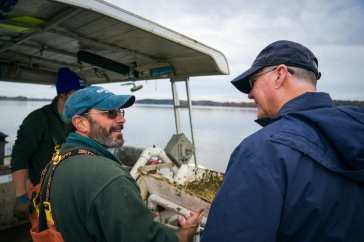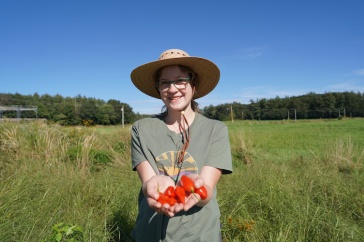
Brenda K. Hess-McAskill, equine facilities manager, and Julia Zabkar '21, an equine studies major, are among those helping Prego and Cannoli regain their health and build their trust in humans.

It’s the stuff of nightmares for animal lovers: 26 horses in need of rescue. But this story has a happy ending, thanks to a concerted effort that included the New Hampshire State Police, Department of Agriculture, Markets and Food and State Veterinarian and a small army of rescuers and volunteers. And while UNH’s acclaimed equine program is not a rescue, the horse-lovers here on campus could not turn their back when two ponies were in urgent need of a place to go.
Equine Facilities manager Brenda K. Hess-McAskill explains, “This is not something we regularly do, but all the pieces lined up for us to help. We had the space, and these ponies did not require around-the-clock care, so we are able to provide what they need as they begin their journey to finding loving rescue homes.”
Over the past two-plus weeks, Cannoli and Prego, who were given new names to commemorate a new chapter in their lives, have taken up residence at UNH, safely separated from UNH’s herd and horses in boarding as they complete their quarantine period and slowly gain weight and build trust with the help of equine faculty, staff and students.
Amanda Patev ‘20, a biomedical science/pre-veterinary major from Merrimack, New Hampshire, lives in one of the UNH Equine Center’s student apartments and has been feeding the rescue ponies each morning and checking in on them at night.
“During both morning feed and evening check, it's really important to observe both ponies and their behavior and how they interact with me and with each other,” she explains. “This is a really crucial task, especially as the ponies transition into their new life here. Any change in behavior could mean something is wrong. In that case, I would need to let one of the barn managers know so appropriate care can be given.”
It might seem those twice-daily visits to the barn would be enough for a busy college student, but Patev wants to do even more: “I'm hoping to work more hands-on with them when the time comes, whether it be grooming and bathing, hand-walking for exercise or maybe even doing some training,” she says.
The pair of hackney ponies, who are estimated at about 10 to 15 years old, are already showing improvement. They’ve been getting daily interaction, quality hay, grain, vitamin supplements, water and salt, have been wormed and have their teeth scheduled to be checked.

Under a gray morning sky on Feb. 8, Hess-McAskill and equine studies major Julia Zabkar ’21 don boot-covers and head out into the ponies’ yard with treats in their pockets to work with the pair. They will wash their hands and change clothes before working with any other horses, showing an abundance of caution should the ponies carry any contagion not yet identified by veterinary tests.
While Prego, the gelding, is the larger of the pair, he arrived more seriously malnourished. Cannoli, a petite mare, also came in without adequate body fat, but she was in better condition than most of the horses rescued in the recent case. She is gentle, sniffing Zabkar’s hand during this first meeting, leaning close to her as she gets a treat. Zabkar is one of 15 equine students who’ve volunteered to help care for the ponies as they continue their recovery. The Milton, New Hampshire, resident came to UNH specifically for equine studies. What does she think of the program after more than a year? There’s no hesitation to her response: “It’s better than I imagined.”
And helping these ponies is something she’s honored to do. “I just have a big heart for animals,” she says, smiling. “The ponies are so cute. I just needed to help.”
“They’ve already come a long way,” Hess-McAskill says of the pair as she leads Prego into the yard. “They were quite skittish when they arrived, so we have limited how many students have been able to work with them so far, both to ensure the safety of our herd and to give the ponies time to decompress.”
As if to illustrate how far they’ve come, Prego is curious — giving glimpses to his new spirit now that he has regular meals and warm blankets to help him conserve calories on his journey to building his strength — and Cannoli shows her playful side, rubbing her back in sawdust and rolling over happily.
Can You Help?
UNH Equine is looking for blankets and halters for Cannoli and Prego as they continue their rehabilitation.
Blanket sizes needed are 58” and 62”. Halters should be small pony or weanling size.
Email Brenda Hess-McAskill or call her office at (603) 862-0343.
With her twice-daily visits, Patev has enjoyed witnessing their transformation. “At first they were kind of aloof when I'd go in to feed them, but over the course of the two weeks they've been here, they've really become comfortable and happy,” she says. “Before, they'd kind of stand back when I'd come outside, but now they meet me at the gate every morning — very eagerly looking for food, I might add. I've gotten to witness their individual personalities come out; they are both so sweet, curious and willing. I can't wait to see how they grow and change with more time and more hands-on attention.”
“Caring for these animals has truly been a team effort,” says Liz Johnson, lecturer for the equine program in the department of agriculture, nutrition and food systems. Among those who have helped so far are Dr. Dean Elder, UNH veterinarian, and the New Hampshire Veterinary Diagnostic Laboratory, which donated the lab work needed for the ponies, including the Coggins test for equine anemia. “It’s been amazing watching all the pieces come together to make this happen, from Brenda and the barn staff to the students, from our dean to the veterinary staff to the entire equine community, helping where we could.”
Patev agrees. “I was so excited when I learned that I'd have a chance to be a part of helping to rehab Prego and Cannoli. It's been really great to see so many people come together for the benefit of these ponies,” she says. “I've never done anything like this before, so it is a great learning experience. It's definitely the best part of my day when I go out to see them, and I'm excited to see what the future holds.”
Interested in learning more about adopting one or both of these special ponies when their care is complete? Email Brenda Hess-McAskill or call (603) 862-0343.
-
Written By:
Jennifer Saunders | Communications and Public Affairs | jennifer.saunders@unh.edu | 603-862-3585


















































